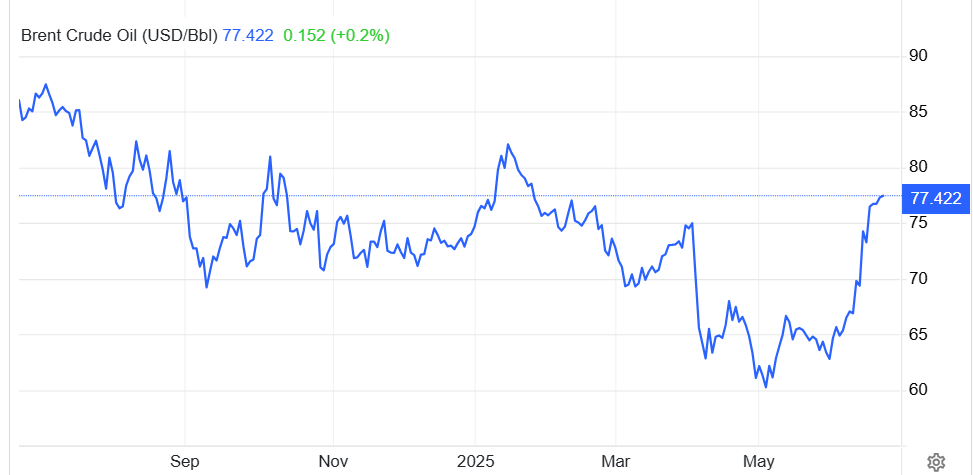
Macro Briefing: 23 June 2025

Israel and Iran continued to exchange missile attacks on Monday as Iran asks Russia for more support following the US strike on Tehran’s nuclear facilities… “Traders are holding their breath, waiting to see if Israel or Iran expand this conflict beyond military and political targets into trade…
Israel and Iran continued to exchange missile attacks on Monday as Iran asks Russia for more support following the US strike on Tehran’s nuclear facilities. Meanwhile, markets are on edge as investors consider how or if Iran may respond. A key vulnerability for the world economy is the Strait of Hormuz in the Persian Gulf, a chokepoint through which roughly a third of global oil exports flow. At the moment, the price of crude oil (a proxy for risk sentiment re: Iran) is mostly steady, trading around the $77 mark for Brent. “Traders are holding their breath, waiting to see if Israel or Iran expand this conflict beyond military and political targets into traded energy,” said Bob McNally, founder of Rapidan Energy Advisers LLC and a former White House energy official. “So far, no one has pulled that trigger — and if they don’t, I can see the price reversing.”
Markets on Monday are downplaying the US attack on Iran. “The markets view the attack on Iran as a relief with the nuclear threat now gone for the region,” said Dan Ives, managing director at Wedbush. He anticipates minimal risks that the Iran-Israel conflict will spreading to the rest of the region and instead will remain relatively “isolated.”
Israel’s stock market has been rising in recent days,” signaling renewed confidence in Israel’s position and strategy—and Donald Trump’s decision to strike Iran’s nuclear sites has only strengthened that perception,” reports The Wall Street Journal. “It appears investors are betting that Israel’s strikes on Iran will deal a crippling, if not decisive, blow to the regional axis linking Tehran to Hezbollah and its other proxies.”
The US Leading Economic Index fell again in May. The six-month decline accelerated in the latest update. “The LEI’s negative six-month growth rate and contraction in the diffusion index over the past six months triggered the recession signal in May,” the Conference Board advised.
Electricity prices for US households rose faster than inflation since 2022 and the trend is expected to continue, according to the US Energy Information Administration. Retail electricity prices would outpace inflation through 2026. The key factor: demand is outstripping supply.
Small-cap stocks in foreign developed markets have been outperforming their large-cap counterparts — in sharp contrast with weak US small-cap performance, notes TMC Research, a unit of The Milwaukee Company. International small caps look positioned for continued strength due to favorable valuations and recent momentum.
Author: James Picerno


